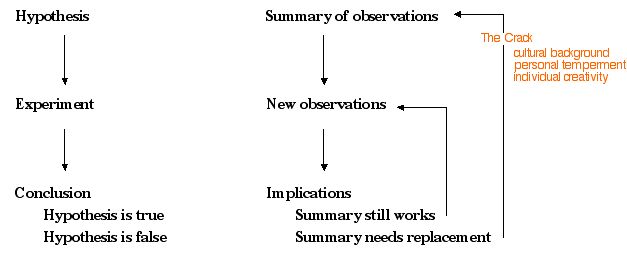
Look always for things that aren't being done as well as they might
Imagine ways to improve them
Be willing to test your imagined improvements in practice
Share your new understandings with others
Repeat
Notes for Discussion at
Metropolitan College of New York
21 June 2005
The Place of Science (more obviously):
| Science as body of knowledge Science as process | ||

|
Learn what others have learned about how to do a job
Look always for things that aren't being done as well as they might Imagine ways to improve them Be willing to test your imagined improvements in practice Share your new understandings with others Repeat |
|
How to teach science
Science as shared "story telling", "getting it less wrong" ... How to do it, in practice?
Some aids to thinking/conceiving/experimenting ...
|
| About Serendip | Forum
About Serendip | Forum List |